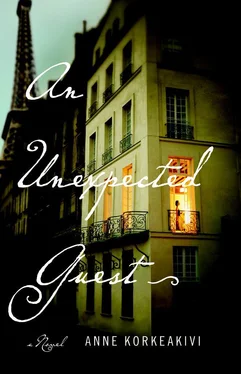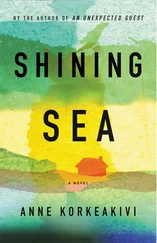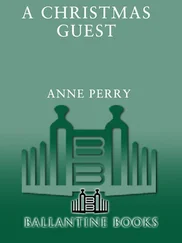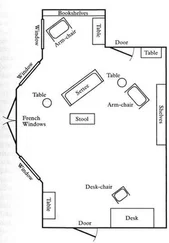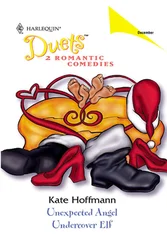“I’m not ready to think about summer yet,” she told Marco. “It’s so pleasant, springtime in Paris. I just want to think about today and tomorrow.”
“Of course,” Marco agreed, giving a last twist to her hair.
She could see the embassy’s car pull up outside, a dark shape like the shadow of a sand shark beneath a dock. Her driver was back, waiting. Marco held up a hand mirror so she could see the back of her hair, and she nodded her approval and thanked him. At the reception desk of the salon, she tapped in the code for her bank card and reinserted her earrings. In her purse still was the USB stick containing her translation. Looking at it, she thought, I need to step out of this day for a moment.
She dropped her wallet back into the bag and fished the stick out, slipping it into her pocket. She checked her watch. 5:02 p.m. She was back on schedule. She would steal a few moments to visit the publication office at the Rodin Museum.

The driver whipped them around the Place de la Concorde. From the backseat, she watched a throng of cars in all shapes and sizes join them into the centrifugal force exuded by the traffic circle, pulling them in too close to one another, then flinging them out along the Rue Royale or the Champs Elysées or, in their own case, the Voie Georges Pompidou. This was where Louis XVI and, shortly after, Marie Antoinette lost their heads, when the Place trembled not from the weight of small speeding cars but the ill-shod feet of angry republicans. Clare rubbed her neck. The guillotine wasn’t supposed to be painful. But still.
They were out now, over the Seine, on the Pont Alexandre III, heading for Place des Invalides. The sudden sense of space here was uncanny, the monumentality of Paris at its most extreme. Cupids frolicking in the buff, horses with gilt wings thrust into the Parisian firmament. A bateau mouche appeared from under the bridge, making its way down the Seine like softened butter being spread on bread, tiny ripples following its wake.
“Je descends devant la Musée Rodin, s’il vous plaît,” she told the driver. The entrance to the Rodin Museum was literally steps from the Residence. She shouldn’t lose more than fifteen minutes by stopping there to drop off the translation. As soon as she’d left the hairdresser’s, she’d called Amélie; everything was going according to schedule at the Residence.
The car zoomed towards the face of the Invalides and zigzagged, left, then right, then left again, onto the Rue de Varenne. The driver pulled up in front of the museum. “Merci,” she told him, looking around this time before stepping out into the open to see who might be on the street. Just a steady trickle of office workers coming out at the end of their workdays and a few tourists wearing fleece jackets. She shut the car door behind her.
The French Ministry of Culture had recently redone the museum entrance. She missed the shabby old entry as it used to be: a crumbling stone cubbyhole that spilled out directly into the gardens, manned by a makeshift wooden ticket booth. The magical instant of stepping through an unprepossessing break in the old stone wall surrounding the property to find oneself amidst eighteenth-century splendor. The monolithic new entrance, incorporated into a nineteenth-century chapel, looked modern in a faux-Egyptian way, a smooth, slick style that had become only recently popular amongst museums. It made her feel old. The museum entrances she’d floated through as a student trying out her nascent French, Italian, and Spanish skills on the European continent had been completely different.
The ticket seller who always wore a dark-colored turtleneck, no matter the weather, was stationed at the first cash register. He raised an eyebrow at her.
“Bonjour—” she began.
“C’est dix-sept heures seize,” he said and pointed to the clock on his cash register. “Dernière entrée à dix-sept heures quinze.”
5:16 p.m. Last entrance was at quarter past five.
“Thank you,” she responded in French. “But I am not here for the museum today. I am here for le service culturel. ”
By now, back at the Residence, the flowers had been delivered, which Amélie would have put around in their vases. No more deliveries expected. No more surprises. Just her clothes to change, and the dinner preparations to be finished. Mathilde was giving the dinner roll dough its second pounding. Amélie’s cousin had arrived, and she and Amélie were peeling potatoes to soak in cold, salted water.
She waited as the ticket seller called the museum’s publication office.
“Personne ne répond.” He set his phone back down and pointed again to the cash register’s clock.
Everyone in the office had left for home already. At least — closing up the files on their desks, the files on their computers, smoothing their skirts, sealing the envelopes of their day’s correspondence — they weren’t answering phone calls. Delivering the translation would have to wait after all. Not a big deal, as Sylvie wasn’t expecting it until after the weekend now. Certainly not worth arguing over with the ticket seller.
She couldn’t bring herself to move away, however. The light shining into the entryway from the gardens was mesmerizing. All that rain, finally stopped, had brought flowers, and the air was full of their perfume. How glorious the museum gardens must have been all day under the bright sky, with the light breeze of spring rippling through them. With all that had happened since, she’d almost forgotten the morning sunlight slanting into the apartment, the fragrance of blossoms wafting in through the Residence’s open windows, the thrill of a rain-free day in springtime. The wild wisteria brightening the Residence’s courtyard.
The gardens stayed open later than the museum. Just five minutes — the time she would have spent delivering the translation. Just one quick turn, to see whether the wild cherry trees were in bloom yet. With all the rain and drizzle Paris had had, weeks had passed since the last time she’d so much as walked through the gardens.
A desire as deep as breath came over her. She had to go in.
“C’est pas grave,” she told the ticket seller. “Merci et bonne journée.”
Instead of turning back out the entrance, she searched inside her wallet for her membership pass and flashed it at the guard by the door.
The pale monumental facade of the Hôtel Biron, the chief museum building, stood directly ahead, a maze of symmetrical rose gardens and clipped box trees fanning out in front of it. She passed before them without giving the building a second thought and headed for the main part of the garden, on the sunny southern side. She barely paused before the Gates of Hell, flanking the property’s eastern wall, all those agonized bodies in various aspects of contortion, the heat of their deep bronze reflecting back at her. There was Eve, her plump arms hugging her curvy torso, her head bowed. The catalog Clare had most recently worked on suggested that the model for the statue had been in the early stages of pregnancy and had found Rodin’s studio too chilly. And, yes, even in the spring sun, she looked uncomfortable.
Clare continued around the building into the garden’s large southern end. Deep chartreuse leaf buds were already coursing across the trunks and branches of the linden trees. Jaunty yellow daffodils waved their strange snouts in the afternoon breeze amidst the bright blue bells of grape hyacinths. Along the garden’s central alley, people stood or strolled chatting, talking on cell phones, ogling the bronze sculptures strewn here and there amongst the growth. An elderly trio nodded to her.
Читать дальше
